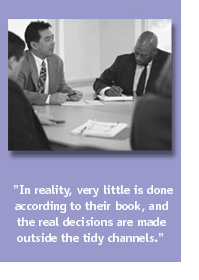
Sell The People Who Can Buy
| Ïðîäàæè | ||||
| Sales.com | ||||
| Premium... | ||||
by Tom Hopkins
 Many
salespeople spend endless hours with people who can't say yes. In commercial/industrial/government
sales, this is an ever-present problem. Typically, you can't walk in and
talk to the person who is in charge. In many cases, you'll be told that
no one individual will make the decision you seek, that all such decisions
are the sole prerogative of the board of directors, trustees, or whatever.
When you're told that, you'll almost always be given to understand that
every member of the decision-making group is away and unavailable. In
essence, they are an unreachable committee.
Many
salespeople spend endless hours with people who can't say yes. In commercial/industrial/government
sales, this is an ever-present problem. Typically, you can't walk in and
talk to the person who is in charge. In many cases, you'll be told that
no one individual will make the decision you seek, that all such decisions
are the sole prerogative of the board of directors, trustees, or whatever.
When you're told that, you'll almost always be given to understand that
every member of the decision-making group is away and unavailable. In
essence, they are an unreachable committee.
What you're hearing is the truth—it's just not all the truth. The committee exists. It meets regularly. It can make decisions. All important decisions are approved by it. And its members are, for all practical purposes, unavailable to you. Under the law, or in the by-laws, all the power in that organization is given to this group.
However, such unreachable committees rarely exercise any power that's important to you. They have it, but they don't use it because there's too much complexity and too little time. Willingly or not, the directors, trustees and various boards of this and that have to rely on the nameless gnomes in the backrooms for recommendations that they can only approve or disapprove. Of course, the gnomes are nameless only in the sense that the don't sign annual reports or get mentioned on cornerstones. But their signatures activate purchase orders.
There are few situations in sales that are more complex and easier to botch than the unreachable committee. In no other area will your sensitivity to small clues and the subtle nuances of power be better rewarded.
Organizations have purchasing procedures that involve several people, much time, more paperwork, and they all move through clearly defined and tidy channels in complete conformity to law and the dictates of their governing bodies or owners. That's the face the organization shows to the world, and it has the paperwork in its files to prove that everything has been done according to their books.
In reality, though, very little is done according to their book, and the real decisions are made outside the tidy channels. The paperwork to justify those decisions is then created after the event.
Flexibility is vital in these situations. Rigidity is dangerous to your success. Keep the ideas that follow in mind when you work with the unreachable committee situation and they'll frequently help you find your way—follow them blindly and they'll sometimes take you off the road and over the cliff.
Adapted from How To Master the Art of Selling © 1982 by Tom Hopkins International, Inc.